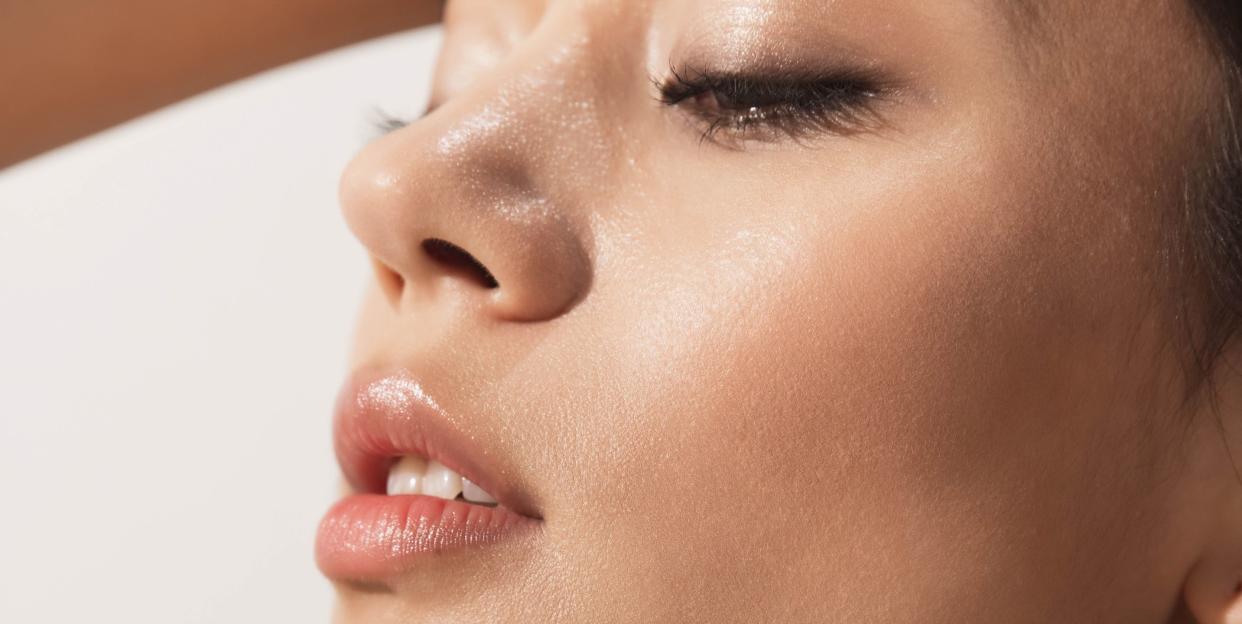What's your skin type? How to decode your complexion

Alright, I’ll level with you, I’ve worked in the beauty industry for nearly 10 years, but I still get a bit confused about the whole ‘skin type’ thing. Sure, I get that there are different characteristics that help define our complexions - and that these often allow us to better understand what is going on below the surface of our skin. But, here's where I get a little lost... I have an oily t-zone, reoccurring spots along my jawline (hi, hormones), and every now and then, my cheeks get Sahara-dry.
So, what does this mean? How can I make an informed decision about which skin care products to purchase, when I'm totally confused by what my skin type actually needs?
I figured I can't be alone in my confusion, so why not seek out the experts (aka, dermatologists) to decode the riddle that is skin types and breakdown exactly what, how, and why it can be helpful to shop for tailored products.
Oily Skin
What’s the deal?
Visible pores, shiny skin, prone to blackheads? These are all key indicators of oily skin according to Consultant Dermatologist Dr Anjali Mahto. “Having had oil-prone skin for most of my adult life, I can certainly relate” says Dr Mahto.“For anyone dealing with bumpy texture and pores the size of planets, I’m right here with you.”
Never skip:
Retinols are basically your BFF. “They have multiple benefits including oil reduction and fighting acne” says Consultant Dermatologist for Skin+Me, Dr Ben Esdaile.“Other useful actives for oily skin include salicylic acid (BHAs). Many of these actives can be drying, so using a good moisturiser can help fight this.” Of course, SPF is a must if you’re using acids or retinoids, so make sure your routine is never without.
Stay clear of:
“Oily skin can be prone to blemishes, so using products that further block pores can worsen breakouts” says Dr Esdaile. “Heavier moisturisers containing ingredients such as paraffin, petroleum jelly, beeswax should be avoided.”
Dry Skin
What’s the deal?
“Dry skin has a tendency towards redness, scaly patches and the feeling of tightness” says Dr Mahto. This is because it produces less oil (aka sebum) compared to most other skin types, explains Dr Esdaile, “dry skin is not able to retain moisture and leads to a rough and sometimes flaky surface.”
Never skip:
The single most important thing to remember when treating dry skin? Restore. Your. Skin. Barrier. Get that right and you’ll prevent a whole load of moisture loss.“Look out for ingredients like Hyaluronic acid, Shea butter, ceramides and glycerin” says Dr Esdaile. All of which work to hydrate and strengthen the skin barrier, allowing it to hold in moisture.
Stay clear of:
Dr Mahto recommends “avoiding long, hot showers, as they can strip the skin of moisture”, instead, opt for warm water and try to keep things speedy. “When cleansing, only use gentle soaps and washes and avoid unnecessary exfoliation, which could lead to further irritation.”

Combination Skin
What’s the deal?
As the name suggests, when it comes to combination skin some areas of the complexion might be prone to dryness, whilst other areas are oily. “The classical distribution is oily over the T-zone of the face and dry skin around the cheeks” says Dr Esdaile.
Never skip:
Keeping each part of the skin happy can be tricky when there are different needs to cater for. “It’s still really important to hydrate combination skin, using a moisturiser with ingredients such as hyaluronic acid” saysDr Esdaile. “For congested areas, gentle exfoliants with low doses of BHAs like salicylic acid can be helpful.”
Stay clear of:
Balance is everything. You don’t want to go for overly rich formulas that could clog pores, or harsh, decongesting ingredients that could strip the skin of moisture. Instead opt for milder concentrations when selecting your skincare. “Stay away from dehydrating products such as detergents and soaps, so as not to cause aggravation to the skin barrier” recommends Dr Esdaile.
Sensitive Skin
What’s the deal?
One of the trickiest skin types to treat, but by no means impossible... Dr Mahto explains that there’s no fixed dermatological definition for sensitivity, “it depends on how each individual reports the sensations of their skin”. That being said, “sensitive skin types are often characterised by facial redness, burning, itching and dryness to varying degrees.”
Never skip:
“When it comes to actives, Azelaic acid and niacinamide are often better tolerated than products such as retinoids and acids” says Dr Esdaile. Of course, protecting your sensitive skin is oh-so important, Dr Mahto recommends opting for “sunscreen with zinc or titanium (mineral-based SPFs), rather than those with chemical filters which have the potential to drive sensitivity”.
Stay clear of:
Sensitivity can be unpredictable, so it’s important to try to identify any triggers and then avoid these as much as possible. “Fragrances can be a common culprit of irritation” explains Dr Mahto, so stick to scent-free formulas. “Harsh soaps, toners, astringents and exfoliating products should also be avoided.”
Acne-Prone Skin
What’s the deal?
“Acne-prone skin tends to get regular breakouts and they are often quite persistent” says Dr Esdaile. Just remember you are not alone; acne is incredibly common. In fact, according to Dr Mahto it accounts for more than 3.5million GP appointments per year, and that’s not just teens, acne can affect up to 20% of women for the first time over the age of 25 years.
Never skip:
“Ideally your products should be labelled as ‘non-comedogenic’” says Dr Mahto, which basically means they won’t clog up your pores – handy, huh? “Whilst that’s not a guarantee that the formula won’t break you out, it’s better than a product that is not labelled at all.” Dr Mahto also recommends looking out for salicylic acid, glycolic acid, zinc, tea tree oil, benzoyl peroxide, niacinamide and retinol.
Stay clear of:
“Stay away from facial oils and thick, creamy textures in products” recommends Dr Mahto, instead, opt for lighter formulations. “Care should also be taken with rich or waxy hair products, as they can induce forehead acne” says Dr Esdaile.
Don't fight change
Change can be tricky, but when it comes to your skin it’s to be expected. “Over time, a person’s skin type can change due to a number of different factors, these include age, lifestyle, and hormones” says Dr Mahto. “All of which can influence how our skin reacts and behaves.” So, remember to keep an eye on any new developments and pivot your skincare routine accordingly.
You Might Also Like


